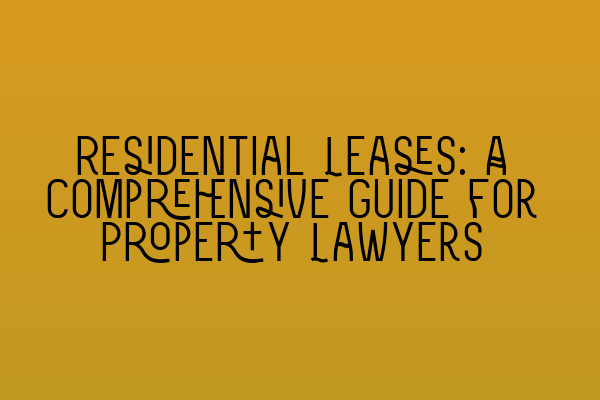Residential Leases: A Comprehensive Guide for Property Lawyers
Residential leases play a critical role in property law, governing the rights and responsibilities of both tenants and landlords. As a property lawyer, it is essential to have a comprehensive understanding of residential leases to provide informed advice and representation to your clients.
What is a Residential Lease?
A residential lease is a legally binding contract between a landlord and a tenant, granting the tenant the right to possess and use the property for a specified period of time. The lease outlines the terms and conditions governing the tenancy, including rent, duration, and obligations of both parties.
It is important to note that residential leases are subject to various laws and regulations, which may vary depending on the jurisdiction. Therefore, property lawyers must stay up to date with the relevant legislation and case law to ensure the protection of their clients’ rights and interests.
Key Elements of a Residential Lease
1. Identification of the Parties: The lease should clearly identify the landlord and the tenant, including their legal names, addresses, and contact information. This ensures clarity and enables effective communication between the parties.
2. Description of the Property: The lease should contain a comprehensive description of the property being leased, including its address, size, and any specific features or amenities. This description ensures that the tenant knows what they are leasing and avoids any potential misunderstandings.
3. Term of the Lease: The lease should specify the duration of the tenancy, whether it is for a fixed term or a periodic tenancy. It is essential to clearly state the start and end dates of the lease or the notice required for termination in the case of a periodic tenancy.
4. Rent and Payment Terms: The lease should outline the amount of rent, the due date, and the acceptable methods of payment. It should also specify any penalties for late payment or bounced checks. Including these terms ensures that both parties are aware of their financial obligations.
5. Security Deposit: If a security deposit is required, the lease should clearly state the amount, the purposes for which it may be used, and the conditions under which it will be returned to the tenant. This protects the landlord’s interests and provides clarity to the tenant.
6. Repairs and Maintenance: The lease should allocate responsibilities for repairs and maintenance, specifying which party is responsible for specific tasks. This helps prevent disputes and ensures that the property is well-maintained during the tenancy.
7. Restrictions and Prohibitions: The lease should include any restrictions or prohibitions imposed on the tenant, such as limitations on pets, smoking, or alterations to the property. These terms help protect the landlord’s property and maintain a harmonious living environment for all tenants.
8. Termination and Renewal: The lease should outline the procedures for termination or renewal of the tenancy, including any notice periods required by law. This ensures that both parties understand the process and can plan accordingly.
Importance of Seeking Legal Advice
Given the complex nature of residential leases, it is highly advisable for both landlords and tenants to seek legal advice before entering into any agreement. Consulting a property lawyer can ensure that your rights and interests are properly protected.
A property lawyer can review the terms of the lease, identify any potential issues, and negotiate favorable terms on your behalf. They can also provide guidance and representation in case of disputes or breaches of the lease.
To ensure the successful outcome of your lease agreement, it is crucial to work with an experienced property lawyer who specializes in residential leases.
Conclusion
Residential leases form the foundation of landlord-tenant relationships in property law. As a property lawyer, it is crucial to have a thorough understanding of residential leases, including their key elements and the legal requirements surrounding them.
By staying informed about legislation and case law developments and seeking legal advice when needed, property lawyers can provide valuable guidance and representation to their clients in all matters related to residential leases.
Are you preparing for your SQE exams? Check out our SQE 1 Practice Exam Questions and SQE 1 Practice Mocks FLK1 FLK2 to enhance your preparation. We also offer comprehensive SQE 2 Preparation Courses and SQE 1 Preparation Courses to help you succeed in your journey to becoming a qualified property lawyer. Stay updated with important dates by checking the SRA SQE Exam Dates.
